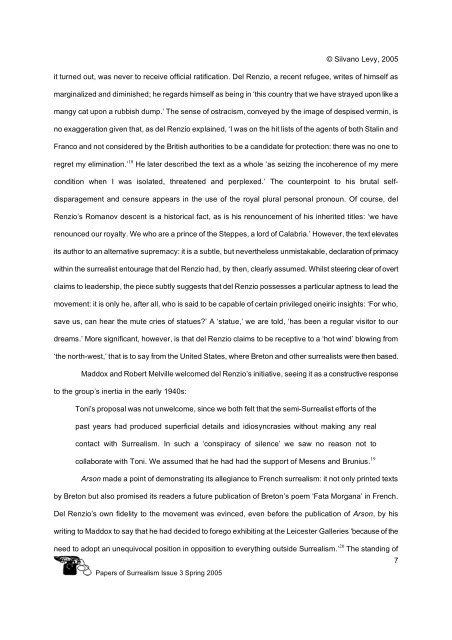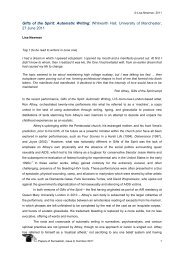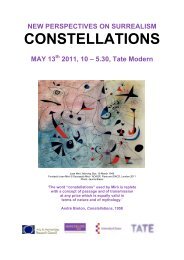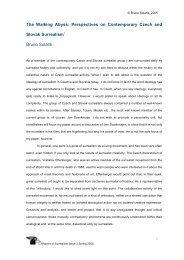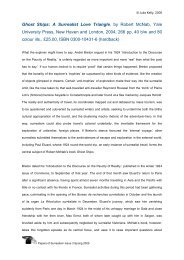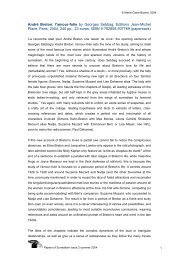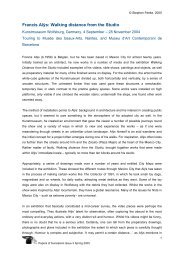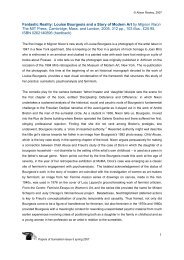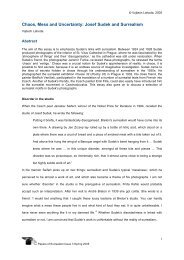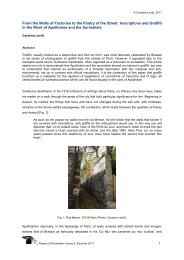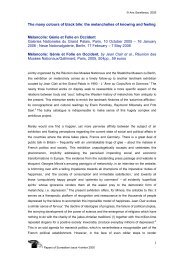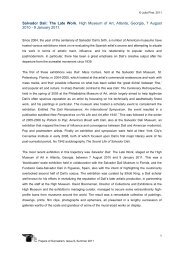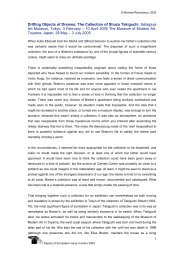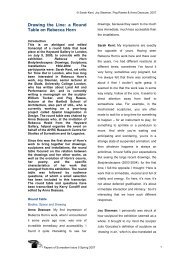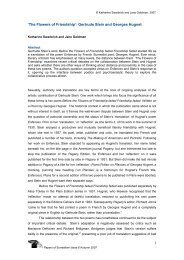The del Renzio Affair: A leadership struggle in wartime surrealism
The del Renzio Affair: A leadership struggle in wartime surrealism
The del Renzio Affair: A leadership struggle in wartime surrealism
You also want an ePaper? Increase the reach of your titles
YUMPU automatically turns print PDFs into web optimized ePapers that Google loves.
© Silvano Levy, 2005<br />
it turned out, was never to receive official ratification. Del <strong>Renzio</strong>, a recent refugee, writes of himself as<br />
marg<strong>in</strong>alized and dim<strong>in</strong>ished; he regards himself as be<strong>in</strong>g <strong>in</strong> ‘this country that we have strayed upon like a<br />
mangy cat upon a rubbish dump.’ <strong>The</strong> sense of ostracism, conveyed by the image of despised verm<strong>in</strong>, is<br />
no exaggeration given that, as <strong>del</strong> <strong>Renzio</strong> expla<strong>in</strong>ed, ‘I was on the hit lists of the agents of both Stal<strong>in</strong> and<br />
Franco and not considered by the British authorities to be a candidate for protection: there was no one to<br />
regret my elim<strong>in</strong>ation.’ 18 He later described the text as a whole ‘as seiz<strong>in</strong>g the <strong>in</strong>coherence of my mere<br />
condition when I was isolated, threatened and perplexed.’ <strong>The</strong> counterpo<strong>in</strong>t to his brutal selfdisparagement<br />
and censure appears <strong>in</strong> the use of the royal plural personal pronoun. Of course, <strong>del</strong><br />
<strong>Renzio</strong>’s Romanov descent is a historical fact, as is his renouncement of his <strong>in</strong>herited titles: ‘we have<br />
renounced our royalty. We who are a pr<strong>in</strong>ce of the Steppes, a lord of Calabria.’ However, the text elevates<br />
its author to an alternative supremacy: it is a subtle, but nevertheless unmistakable, declaration of primacy<br />
with<strong>in</strong> the surrealist entourage that <strong>del</strong> <strong>Renzio</strong> had, by then, clearly assumed. Whilst steer<strong>in</strong>g clear of overt<br />
claims to <strong>leadership</strong>, the piece subtly suggests that <strong>del</strong> <strong>Renzio</strong> possesses a particular aptness to lead the<br />
movement: it is only he, after all, who is said to be capable of certa<strong>in</strong> privileged oneiric <strong>in</strong>sights: ‘For who,<br />
save us, can hear the mute cries of statues?’ A ‘statue,’ we are told, ‘has been a regular visitor to our<br />
dreams.’ More significant, however, is that <strong>del</strong> <strong>Renzio</strong> claims to be receptive to a ‘hot w<strong>in</strong>d’ blow<strong>in</strong>g from<br />
‘the north-west,’ that is to say from the United States, where Breton and other surrealists were then based.<br />
Maddox and Robert Melville welcomed <strong>del</strong> <strong>Renzio</strong>’s <strong>in</strong>itiative, see<strong>in</strong>g it as a constructive response<br />
to the group’s <strong>in</strong>ertia <strong>in</strong> the early 1940s:<br />
Toni’s proposal was not unwelcome, s<strong>in</strong>ce we both felt that the semi-Surrealist efforts of the<br />
past years had produced superficial details and idiosyncrasies without mak<strong>in</strong>g any real<br />
contact with Surrealism. In such a ‘conspiracy of silence’ we saw no reason not to<br />
collaborate with Toni. We assumed that he had had the support of Mesens and Brunius. 19<br />
Arson made a po<strong>in</strong>t of demonstrat<strong>in</strong>g its allegiance to French <strong>surrealism</strong>: it not only pr<strong>in</strong>ted texts<br />
by Breton but also promised its readers a future publication of Breton’s poem ‘Fata Morgana’ <strong>in</strong> French.<br />
Del <strong>Renzio</strong>’s own fi<strong>del</strong>ity to the movement was ev<strong>in</strong>ced, even before the publication of Arson, by his<br />
writ<strong>in</strong>g to Maddox to say that he had decided to forego exhibit<strong>in</strong>g at the Leicester Galleries ‘because of the<br />
need to adopt an unequivocal position <strong>in</strong> opposition to everyth<strong>in</strong>g outside Surrealism.’ 20 <strong>The</strong> stand<strong>in</strong>g of<br />
7<br />
Papers of Surrealism Issue 3 Spr<strong>in</strong>g 2005


